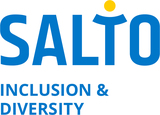Some other Disabilities
- Find this and a lot more in the SALTO Inclusion for All booklet: No Barriers, No Borders
Persons of short stature
- Do not treat adults as cute or as a child because they are small
- Put the material you are using for your activities within reach (not on the top shelf)
- Have flipcharts for writing on or sign- up lists low down or provide (makeshift) steps
- You could offer a pillow to put on chairs, provide steps in the bathroom, take the showerhead down,...
- Check if there are lower public phones at/around the venue, lower urinals and lower service counters available
- Do activities where people sit down or are at the same height (or where everybody is at different heights anyway)
- Place yourself at eye-level to communicate, e.g. sit down, kneel, or stand back so you can watch without straining each other's neck
- Small people also have shorter legs, which means that doing long distance can be tiring. Provide alternative means of transport if necessary.
- ...
^^ top ^^
Speech disorder
- If you didn't understand the person, do not pretend that you do. Don't be afraid to ask the person to repeat. Getting nervous or embarrassed doesn't help the communication.
- Repeat to see if you understood the person. Be patient and take as much time as necessary.
- Don't interrupt or try to finish the person's sentences. Don't just nod unless you have understood the full messages.
- If you really didn't understand the person, you can use alternative means of communication: writing, drawing, gestures,... but first ask if this is ok
- Try to ask questions which require only short answers or a nod of the head.
- Do not speak for the individual or attempt to finish her or his sentences.
- Communication works best in a quiet environment where you can concentrate on what the person is saying.
- Make sure people with a speech disorder or not laughed at or teased.
- ...
^^ top ^^
Epilepsy (seizure disorders)
- Know the severity of the epilepsy. Some people only get shaking hands whereas others fall over and experience wild movements
- To find out from the person, the parents or the social workers what they have experienced is the best thing to do in case of an epileptic seizure. Sometimes they use an injection that calms them down, sometimes they simply wait till it's over,...
- Be aware that flashing lights or beepers sometimes can provoke an epileptic seizure, so it is advisable to avoid this as much as possible (e.g. stroboscopes in discos, car lights passing by in the dark, mobile phone beeps,...)
- If a person has a seizure, there is not much you can do about it - just give them time until it finishes. If the person falls down, make sure the head is protected and make sure they don't swallow their tongue, but do not restrict their movements.
- Think of taking a spare set of clothes when going on excursions. A person could loose bodily fluids during a seizure.
- When a seizure has finished, the person may feel embarrassed or disoriented. Provide some time and private space to collect him or herself again.
- ...
^^ top ^^
Cerebral palsy
Cerebral palsy is an impairment that makes it difficult for the person to control their muscles, which has an effect on their movements and sometimes speech (in varying degrees). But this doesn't mean that they have limited intellectual capacities or a cognitive disability. Therefore, start interaction assuming the highest possible level of intellectual skills and simplify if this person with cerebral palsy also has cognitive disability.
- Most of the tips & tricks provided for people using a wheelchair or who have a mobility impairment are valid as well for people with cerebral palsy.
^^ top ^^
Psychiatric conditions
It could happen that you have people with phobias, depressions or other psychiatric disorders on your project. The most difficult part is that these conditions are not visible, so you would need to find out from them what their psychiatric condition is. Many don't consider this as a disability, even though in many cases psychiatric conditions do affect people's effective functioning in society. Persons with a psychiatric condition can be fine usually, but they can be sensitive to stress and strong emotions. It is best to find out, before your project, from the young person, their parents or psychologist what their conditions is, what things you can do/avoid to make them feel better and how you can best behave if they get into a crisis.
^^ top ^^
 Protected from exclusion
Protected from exclusion

Downloads
The following downloads are available:
- No Barriers No Borders - international mixed-ability projects - 2008 update
How to set up international projects with young people with and without a disability. With lots of tips & tricks about partnerships, funding, working with disability,... Based on SALTO TC Enable 2003
